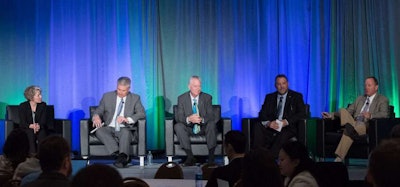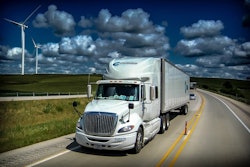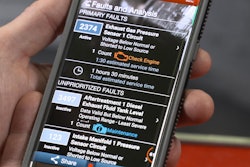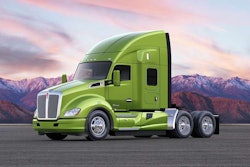
Top truck manufacturers at ACT Expo this week in Long Beach were in agreement that the trucking industry will keep on trucking down the path of greater fuel and fleet efficiency despite any road blocks that the Trump administration may have in store for Phase II of the U.S. EPA’s Greenhouse Gas (GHG) standards for medium and heavy-duty trucks.
During this week’s panel discussion titled “The Future of Heavy-Duty Trucking,” leading executives from Daimler Trucks North America, Navistar, Kenworth, Mack and Peterbilt upheld the market value of fuel efficiency while dismissing a possible rollback on stringent federal emissions as inconsequential.
“I think it doesn’t really matter,” said Steve Gilligan, vice president of product and vocational marketing at Navistar. “I think that we’ve been fortunate that the effects of GHG legislation has been the impetus for improved fuel economy.
“So, we’re of the opinion that those breakthroughs and developments in technology have been fairly well received. And therefore even if there was a change in legislation, it gives an OE who has better fuel economy a competitive advantage in the marketplace.”
Brian Lindgren, research and development director at Kenworth, agreed.
“The product plan that we had in place easily got to those requirements for GHG 1. Similar with GHG 2, our customers are demanding more fuel efficient vehicles. So the things that were planning to do will get us in compliance with GHG 2,” Lindgren said. “The idea is to provide an overall more efficient vehicle so that it provides a better return for our customers.”
Abandoning GHG Phase II technology isn’t much of an option, according to Kary Schaefer, general manager of marketing and strategy at Daimler Trucks North America.
“I think customers will continue to demand fuel efficient choices to run in their fleets. The product development pipeline has already been filled in advance to this,” Schaefer said. “So any roll-back is not going to change the technology development and the vehicle development that’s already happened or is slated to happen.”
Jonathan Randall, senior vice president of North American sales at Mack Trucks, said that while scaling back on GHG 2 can spare some company expense, customers will continue demanding more fuel efficient trucks, which besides lowering fuel costs, also lower emissions.
“There is currently a cost for us to measure and prove compliance to the regulation. If we can take that cost and apply it to product development, I think we all come out more ahead. However, the thing here is that customers are driving for improved performance and fuel economy. And as was said earlier, if you want to reduce greenhouse gas, get better fuel economy,” Randall said.
Picking up where Randall left off, Bill Kahn, principal engineer an engineering manager of advanced concepts at Peterbilt, continued to speak directly to the issue of fuel economy as it relates to driver cooperation. GHG rules or not, fuel saving technology will only work most effectively when drivers are willing to play their part, according to Kahn.
“The funny thing is that we’ve got a truck so fuel efficient and they run at such a nice point, but the drivers don’t want to drive them because they’re too fuel efficient. They want to go faster, they want to climb faster. They’re not actually using the trucks the way they were meant to be used to see that optimum fuel economy,” Kahn said.
“It’s great to go out there and say ‘Guys, we’re building you the most fuel efficient truck there is out there, but you’ve got to drive it right. And people still love to drive the manual transmissions.”
While AMTs look good on paper, they’re not exactly winning over drivers, according to Kahn.
“It can stay in the torque band to make the most fuel economy, but then they [drivers] get mad because someone passes them on the highway.”











